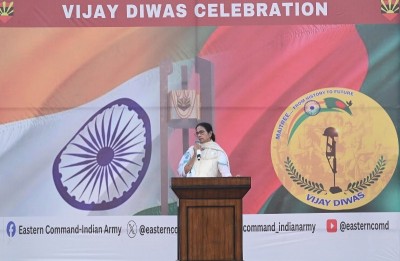
US's OPIC loan to expand access to clean water in India
New Delhi, Mar 26 (IBNS): The Overseas Private Investment Corporation (OPIC), the U.S. Government’s development finance institution, has committed a $12.5 million (Rs. 80 crore) loan to a project that will expand access to affordable clean drinking water to millions of low and middle-income people in India.
OPIC’s loan to WaterHealth India Pvt. Ltd., a subsidiary of WaterHealth International, Inc. of Irvine, California, will help finance the installation of as many as 900 decentralized plants that purify the water on site and sell it at a price that is three to four times lower than bottled water alternatives currently available in the marketplace.
These WaterHealth Vending Machines (WVM) are installed at locations like railway stations, bus stations, shopping malls, public and private institutions or any high footfall location where consumers are able to purchase purified water ranging in amounts from 300ml to 5 liters. Most consumers carry their own bottles and WaterHealth refills them, but consumers may also purchase reusable bottles.
“This project offers an innovative approach to making safe water more available and affordable and illustrates how businesses can develop new solutions to longstanding global challenges,” said Ray W. Washburne, OPIC President and CEO. “By increasing access to clean water, the project will improve the health and quality of life for millions of Indians, particularly women who typically have the primary responsibility for obtaining and managing the household water supply.”
Limited access to safe drinking water is a major health and economic challenge throughout much of the world. In India alone, an estimated 163 million people lack access to safe water, a major cause of diarrheal illnesses that results in 500 deaths of children under the age of five each day. In addition to this massive health cost, insufficient affordable water supplies pose a significant economic and overall quality of life cost, particularly for women, whose time spent gathering water often takes away from time spent on other household tasks or with family or earning income outside the home.
“WaterHealth International has been committed to improving access to safe and affordable drinking water for underserved consumers for over a decade. During that time, we have built the world’s lowest cost, global operating platform for decentralized water purification plants,” said Sanjay Bhatnagar, CEO of WaterHealth International. “Built around the latest quality and operational monitoring technologies, this platform allows anyone the ability to sustainably and affordably provide safe drinking water to consumers in urban and rural areas and in weeks instead of years. We are grateful for OPIC’s leadership and their recognition of our potential to significantly and positively impact the livelihood of all consumers especially women in the regions we operate.”
OPIC’s loan to WaterHealth was committed under OPIC’s new 2X Global Women’s Initiative to mobilize $1 billion to invest in women and unlock the economic opportunity they represent. In addition to expanding the availability of safe water, the project is projected to create more than 1,300 jobs in India and introduce advanced technologies and business models for providing potable water.
Support Our Journalism
We cannot do without you.. your contribution supports unbiased journalism
IBNS is not driven by any ism- not wokeism, not racism, not skewed secularism, not hyper right-wing or left liberal ideals, nor by any hardline religious beliefs or hyper nationalism. We want to serve you good old objective news, as they are. We do not judge or preach. We let people decide for themselves. We only try to present factual and well-sourced news.







